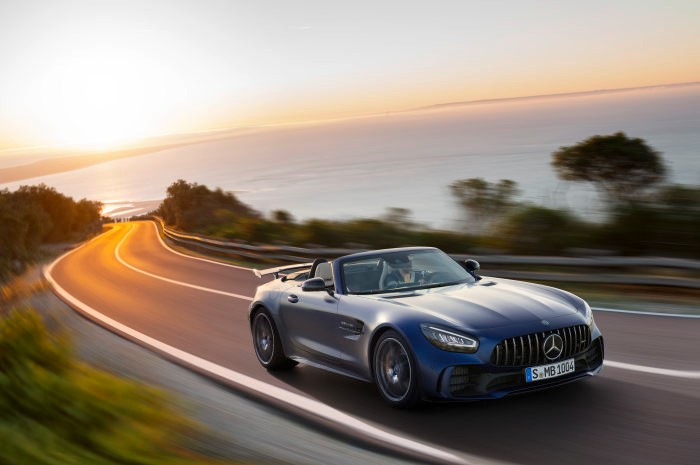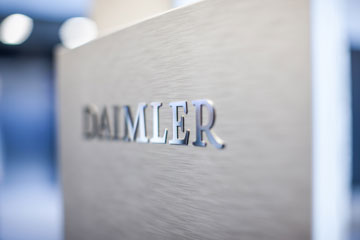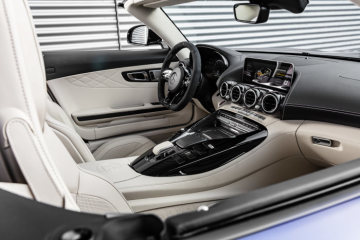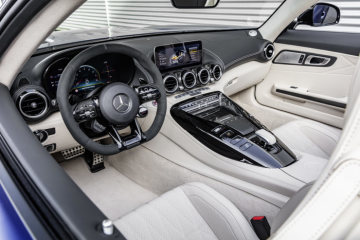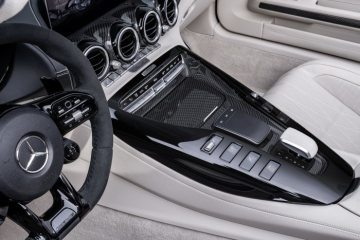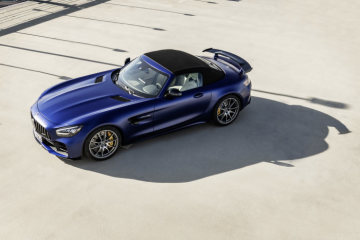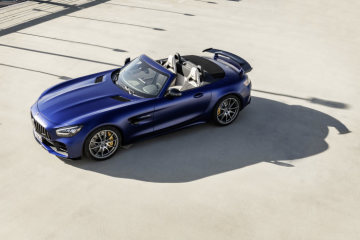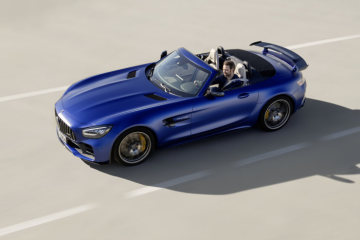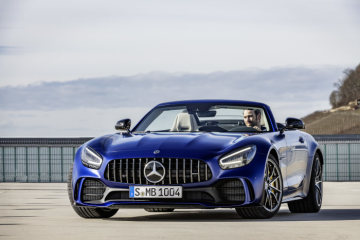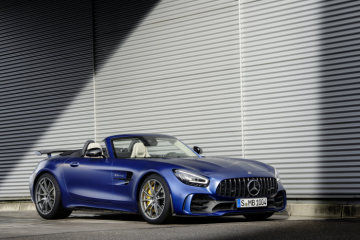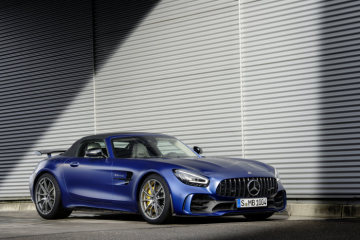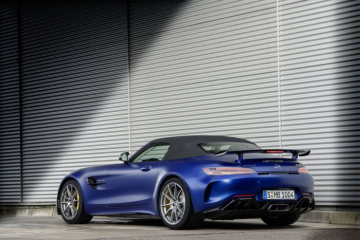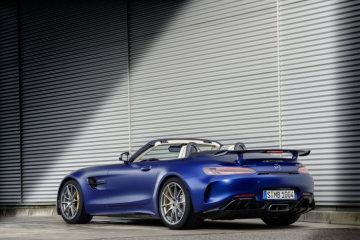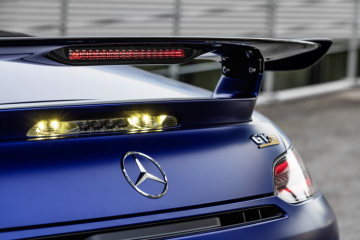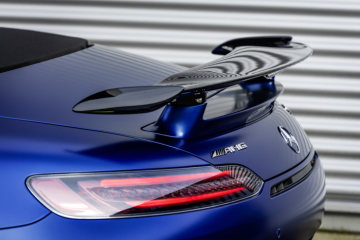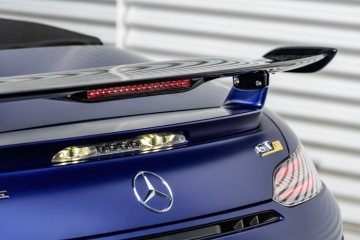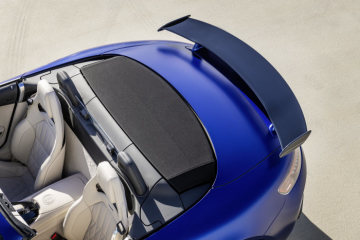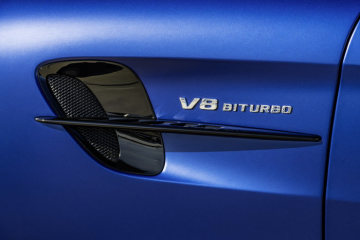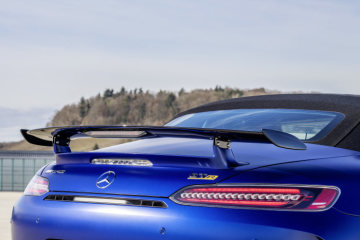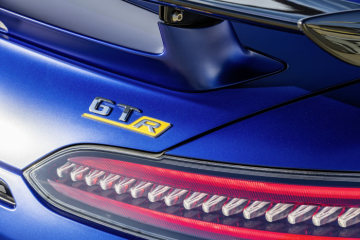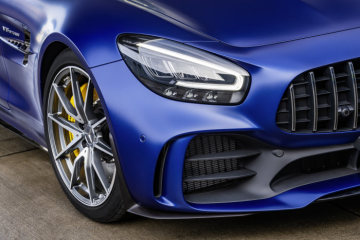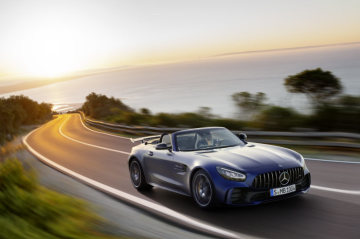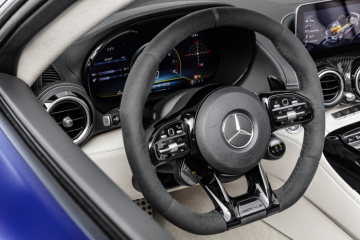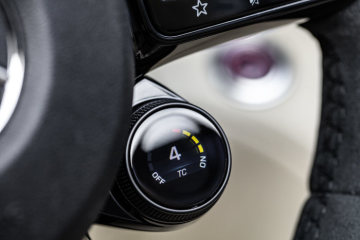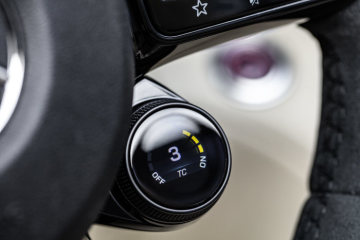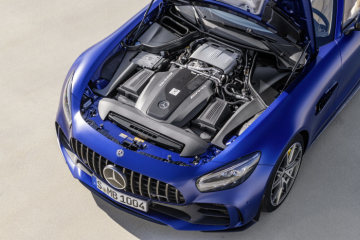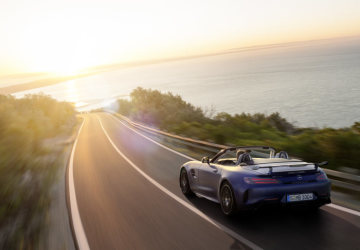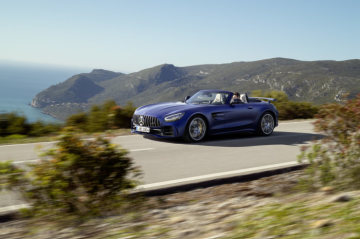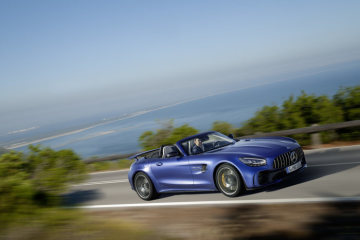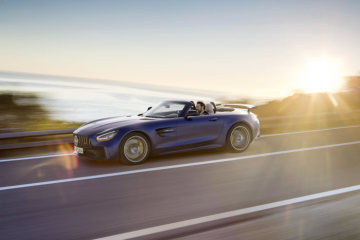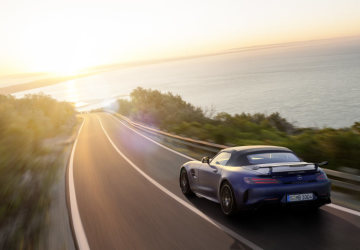
04.
March 2019
Affalterbach
Combined fuel consumption: 12.4 l/100 km; combined CO2 emissions: 284 g/km*
Affalterbach. This combination is just irresistible and is limited to 750 units: Mercedes-AMG is combining its top model brimming with motorsport technology with the freedom of the open-air driving experience – crowning the model portfolio of open-top sports cars. The new AMG GT R Roadster (combined fuel consumption: 12.4 l/100 km; combined CO2 emissions: 284 g/km[1]) is just as much at home on winding racetracks as it is on prestigious boulevards or beautiful coastal roads. With its powerful drive and expressive design it addresses a new, lifestyle-oriented target group which lives life to the full. The 430 kW/585 hp V8 biturbo, the adjustable coil-over suspension with active rear axle steering, the active aerodynamics and the intelligent lightweight construction form the foundations for highly dynamic handling characteristics. And like the other roadster models the open AMG GT R also has the triple-layer fabric soft top with a lightweight structure consisting of aluminium, magnesium and steel.
With this latest addition the AMG GT family now has 16 members: five two-door coupés, four roadsters, two customer sports racing cars and five 4-door coupés. "The new AMG GT R Roadster is far more than the combination of the thrilling vehicle dynamics of the GT R with the special flair of our GT Roadsters. It is the essence of two worlds, blending to deliver our brand pledge, Driving Performance, in a very special way. With our GT R Roadster we have without doubt once again developed a brand-defining sports car. It too embodies Mercedes-AMG in form, function and vehicle dynamics and enriches our GT family with a highly exclusive variant limited to 750 units", says Tobias Moers, Chairman of the Management Board of Mercedes-AMG GmbH.
The AMG 4.0-litre V8 biturbo in the AMG GT R Roadster delivers an output of 430 kW (585 hp) and maximum torque of 700 Nm. This is available over a wide engine speed range from 2100 to 5500 rpm. The eight-cylinder power unit delivers muscular performance in all engine speed ranges, combined with high efficiency. A sprint from standstill to 100 km/h is absolved in 3.6 seconds. The dynamic power delivery continues right up to the top speed of 317 km/h.
Wants to stay ahead even at a standstill: the exterior design
The low-slung front section and the forward-inclined AMG-specific radiator grille create a distinctive "shark nose" impression and make the car appear to sit lower on the road. At the same time, this shape lowers the vehicle's back-pressure point, enhancing the flow of cooling air and the car's aerodynamic performance.
The standard-fit LED High Performance headlamps strengthen the AMG GT family tie with their light signature. A tri-functional, arched light guide takes on the functions of daytime running light, navigation light and turn signals. The multi-chamber reflector system with three single reflectors each for dipped beam and main beam not only ensures optimal illumination of the roadway, but also gives the AMG GT Roadster a sporty, dynamic look which gains even more optical depth as the result of the black background.
The V-shaped arrow-like appearance of the front end also enhances the dynamic looks, thus embodying the uninhibited forwards thrust of the AMG GT R Roadster even before it moves. The front apron in jet wing design and the front splitter emphasise the car's width. The large outer air inlets in the front apron guarantee the increased supply of cooling air to the engine. For this reason, they sport two aerodynamically shaped horizontal fins in place of meshes and as a result route the airflow to the radiators without loss.
Additional Air Curtains on the outside of the front apron calm the airflow, improving the Cd value of the open-top two-seater. Thanks to their narrow, vertical openings, the Air Curtains also guide the air specifically towards the wheel arches, optimising the flow properties. To ensure ideal airflow through the double wheel arch radiators, the roadster additionally features unique wheel arch liners with special cooling-air slits.
Not at all aloof: active aerodynamics profile for more precise handling and better road adhesion
An active aerodynamics profile is concealed almost invisibly in the underbody in front of the engine. Weighing around two kilograms, this light carbon-fibre element is speed-sensitive and automatically extends around 40 millimetres downwards depending on the drive program. This process involves considerable change in the airflow and results in what is known as the Venturi effect, which additionally "sucks" the car onto the road and reduces the front-axle lift by around 40 kilograms at 250 km/h. The aerodynamics profile automatically retracts again depending on the drive program and speed.
The driver can feel the advantages in the steering: the roadster can be steered even more precisely when cornering at high speed and exhibits even better directional stability. Especially during fast cornering and under high lateral acceleration, the vehicle delivers far more agile response with clear steering-wheel feedback while remaining easily controllable at all times. In addition, the drag coefficient is improved. The downforce on the rear axle remains at an unchanged high level.
When the electrically operated profile is extended, the radiator air outlet opens at the front end and precisely guides the air flow towards the double rear diffuser, which therefore also benefits from an optimal flow of air. This improves the handling stability of the rear axle while reducing the temperature level of the hotspots at the rear. At the same time, the aerodynamics measures ensure optimised stopping power by routing more cold air specifically to the wheel disks.
Airy from the front too: the active air management system AIRPANEL
The active air regulation system AIRPANEL included as standard is a particular technical highlight. Vertical louvres at the bottom of the front apron are opened and closed electronically by means of an electric motor in around one second to guarantee the required amount of cooling. Constantly achieving the ideal position calls for highly intelligent and fast control.
During normal driving with no increased cooling demand, the louvres are closed for reduced drag and the air is directed at the underbody. This improves the aerodynamic efficiency. Only when certain components reach predefined temperatures and the air demand is particularly high do the louvres open to allow the maximum cooling air flow to the heat exchangers.
Please take a look at me from the side: flat and sleek proportions
The front wings of super-light carbon add a total of 46 millimetres to the width of the roadster at the front compared with the AMG GT and AMG GT S Roadster and make room for the wider track and large wheel/tyre combinations. The powerfully sculpted wings emphasise the longitudinal dynamics in addition. A further distinguishing feature is the special wing signet featuring a fin and a large air outlet through which the waste heat from the engine bay flows. This fin is perforated and incorporates the AMG diamond logo with five slats.
The side view additionally benefits from the standard-fit AMG Performance forged wheels in matt black. The especially lightweight 10-spoke wheel is exclusive to the AMG GT R models and its highly elaborate design includes a drop-centre rim, a milled groove and two high-sheen rim rings of different width. There are size 10.0 J x 19 ET56 wheels at the front and 12.0 J x 20 ET52 at the rear. The lightweight design of the wheels has three advantages: it reduces the overall weight, the rotatory mass and the unsprung masses.
The brake callipers, which are painted in yellow, can be seen through the wheels. The side sill panels make the vehicle look even lower stance on the road, while inserts in high-gloss black set an individual tone. The same applies to the high-gloss black caps on the housings of the door mirrors.
Broadening out: special rear end design for more cornering speed
The rear end also features numerous, conspicuous differentiations. The aluminium sidewalls make the AMG GT R Roadster 57 millimetres wider at the rear than the AMG GT and AMG GT S Roadster. This creates room for the larger 20-inch wheels and tyres as well as the wider track. These measures make for improved traction while allowing higher cornering speeds.
The wider design of the rear apron with large outer vent openings and vertical swage lines improves the airflow at the rear end, as does the double diffuser. The overall heat dissipation is optimised as the warm air is exhausted by the double diffuser during driving.
A small air outlet is incorporated between the tail lamps for additional dissipation of the heat generated by the rear silencer. A further distinguishing feature of the AMG GT Roadster is the large exhaust tip with centrepiece, which is centrally positioned in the rear apron. It is flanked by two more black tail pipes on the left and right of the diffuser.
The large rear wing with an integral third brake lamp is fixed to the boot lid and increases the downforce on the rear axle. The aerofoil mounts are painted in vehicle colour whereas the blade is finished in high-gloss black. Depending on the application or racetrack conditions the inclination of the aerofoil blade can be mechanically precision-adjusted – for example in order to increase the downforce on the rear axle.
Cap covering the face: the fabric soft top
The three-layered fabric soft top is supported by a magnesium/steel/aluminium structure of low weight, which helps to keep the vehicle's centre of gravity low. The inserted acoustic mat reduces noise.
There is a new exclusive colour shade available for the AMG GT R Roadster, which is also being offered in parallel in the AMG GT R: the fine designo graphite grey magno matt paint extends the colour palette to a total of 14 choices.
Anyone wishing to emphasise the close connection to motorsport even further can choose the optional AMG Carbon-Fibre Packages. With the AMG Carbon-Fibre Package I the front splitter, the fins in the wings, the inserts in the side skirts as well as the rear diffuser are in a high-quality carbon-fibre look. The AMG Carbon-Fibre Package II with the rear aerofoil blade, the rear aerofoil end plates and the outside mirror housing in carbon fibre completes the sporty appearance.
Tailor-made suit for the fashion-conscious: the cockpit
The interior design echoes the design lines of the exterior. The dashboard places a firm emphasis on width, creating an impression of a powerful wing. The driver is integrated into the cockpit thanks to the high beltlines, the door trims with their concave design, the dynamically rising centre console and the low seat position. It feels like a custom-fit suit and made-to-measure shoes – so is very closely connected to the roadster. In the centre console a badge with the inscription "1 of 750" points to the roadster's limited number of units.
With a scarf and cooled cushions on request: AMG Performance seats
The standard-specification AMG Performance seats in black/black Exclusive STYLE nappa leather offer strong lateral support with their more deeply contoured side bolsters on the sitting surface and seat backrest. The neck-level heating AIRSCARF is optionally available, making open-air driving a pleasure even in low outside temperatures. The air outlet is seamlessly integrated in the head restraint section, the temperature of the outflowing air can be adjusted in three stages.
Customers wishing to enjoy comfortable temperatures even on very hot summer days can also opt for the seat climate control, which is also available for the AMG Performance seats. The intensity of the climatisation can be set in three stages.
Other materials and colours are also optionally available:
- Exclusive STYLE nappa leather in saddle brown/black
- Exclusive STYLE nappa leather in macchiato beige /black
- Exclusive STYLE nappa leather in silver pearl /black
As standard the AMG GT R Roadster comes with AMG black carbon fibre/piano lacquer trim elements including the Exclusive Trim Package. The scope comprises the centre console insert and the centre air vent rings in black piano lacquer. The insert in the centre console, the trim around the four air vents in the instrument panel and the trim strips in the armrests in the doors are in high-quality high-gloss carbon fibre. The trim elements are also available in black matt carbon fibre.
Modern times: displays with AMG-specific displays
The AMG GT R Roadster has been given fully digital instrument displays with an instrument cluster measuring 12.3 inches in front of the driver and a 10.25-inch multimedia monitor on the centre console. The instrument cluster offers a screen design with the three AMG-specific display styles "Classic", "Sporty" or "Supersport". In the "Supersport" mode, there is also extensive additional information, such as a prompt to shift up in manual transmission mode. The newly designed visualisations in the multimedia display enable further vehicle functions to be experienced even better, e.g. with an animated presentation of the driving assistance, vehicle and communication systems.
Just the touch of a finger away: display buttons in the centre console
The innovative, coloured display buttons in the V-shaped centre console integrate the display and control of transmission logic, suspension, ESP, exhaust system, aerodynamics profile and start/stop function. Using TFT technology the display buttons use intuitively comprehensible symbols to show the function and are easy to operate with just a small tap of the finger. The display buttons are supplemented by the two rocker switches for the drive programs and volume control of the audio system.
Control in an instant: the AMG Performance steering wheel
The AMG GT R Roadster has also been given the new AMG Performance steering wheel as standard. It is characterised by its sporty design, a flattened bottom section with a heavily contoured rim and intuitive operation. The steering-wheel rim is completely covered in DINAMICA microfibre. The galvanised steering wheel gearshift paddles allow an even sportier driving style with manual gear shifting. The integrated Touch Control buttons can be used to control the functions of the digital dash and the multimedia display by means of horizontal and vertical swiping of the finger.
As standard the AMG steering-wheel buttons also have a round controller with an integrated display as well as two vertically positioned coloured display buttons with switches. The AMG drive programs as well as the AMG TRACTION CONTROL can be actuated via the right-hand controller. The selected setting is shown on the colour LCD display directly integrated in the controller.
The two freely configurable display buttons and the additional switches on the left-hand side enable further AMG functions to be controlled directly on the steering wheel. This means that the driver can concentrate fully on dynamic driving without having to take their hands off the wheel. Each required function can be depicted on the display icon and its switch is tapped by the driver to set the respective function. So the two individually preferred AMG functions can be defined exactly and the settings changed with just one tap of the finger.
The AMG Interior Night Package also comes as standard. In this package, the shift paddles, steering wheel spokes, seat insert (on the AMG Performance seat) as well as the door sills are finished in high-gloss black, which combines with the standard-specification AMG carbon fibre/piano lacquer trim elements to further emphasise the sportiness.
No need to fear the scales: intelligent lightweight construction for high agility
A key factor in a sports car's performance is a gross vehicle weight that is as low as it can possibly be. Mercedes-AMG uses an intelligent material mix in order to achieve this aim in the structure of the AMG GT R Roadster. Various aluminium alloys are used for the chassis and body, and magnesium for the front deck. This extremely light element at the front reduces the inertia ahead of the front axle, thus improving the vehicle's agility. The load-bearing structure of the boot lid is of SMC (Sheet Moulding Compound) bonded with carbon fibres. These high-tech plastics excel with their lightweight design, high strength and outstanding surface quality.
The weight-optimised spaceframe is made of die-cast and extruded aluminium sections. The high bending and torsional strength of the entire design enables extreme linear and transverse forces from the drivetrain and suspension to be absorbed and transferred. Unwanted flexibility is thus reduced, with the vehicle responding precisely and directly. The result is that the driver experiences a sports car with maximum dynamics responding with outstanding precision. The body-in-white now also has an integral aluminium crossmember as rollover protection for the occupants.
Light and strong: Materials from motor racing
A host of further measures contributes to weight reduction as part of the AMG lightweight-performance strategy. Light and strong carbon fibre is the material of choice for, among other things, the front wings and the torque tube between engine and transmission.
Now weighing in at just 13.9 kilograms, the carbon-fibre torque tube is about 40 percent lighter than its already weight-optimised aluminium counterpart in the AMG GT. As a structural component of the transaxle drivetrain, it creates a connection between the engine and the transmission with extreme flexural and torsional stiffness. It permits a very direct connection of the drivetrain that is favourable to driving dynamics and also plays a role in the vehicle's balanced weight distribution.
Further weight advantages come from the standard-fit forged wheels, the titanium rear silencer and fewer soundproofing materials.
Will not warp: Carbon tunnel brace
The tunnel brace in carbon further stiffens the body considerably for withstanding the high torsional loads that occur during powerful acceleration. To this end, it braces the two vehicle sides against each other even more effectively in the tunnel area for the torque tube, This significantly increases the torsional rigidity by some 7.5 percent. After the first few metres already, the driver gets an extremely precise driving impression, which is maintained even in the event of extreme vehicle loads when driving at the dynamic limits. The fact that the body of the car is more composed allows even better control of the AMG GT R Roadster under difficult racetrack conditions such as fast, bumpy corners and means that less steering effort is required.
Over and above this, two diagonal braces in the engine bay stiffen the front end. In the AMG GT R, they are likewise made of carbon fibre and represent weight savings of about 50 percent over steel components.
Revs up fast: the AMG 4.0-litre V8 biturbo engine
The AMG 4.0-litre V8 biturbo delivers 430 kW (585 hp) in the AMG GT R , the maximum torque of 700 newton metres is available from 2100 to 5500 rpm. Different exhaust gas turbochargers with modified compressor processing and a smaller boost pressure control valve cell as well as sharper engine management application are used compared with those in the other AMG GT models. The boost pressure has increased from 1.2 to 1.35 bar. In addition, the exhaust ports have been optimised and the compression ratio modified. The entire combustion process has been retuned.
For optimum power output even when outside temperatures are high, Mercedes-AMG uses indirect air-to-water intercooling. With optimum flow of air and water, the intercoolers have a separate, two-stage low-temperature water circuit. The first cooler stage involves two parallel coolers in the left and right wheel arch. Together with the large cooler in the vehicle front as a second cooler stage the system is particularly powerful.
The downstream charge air coolers through which water flows ensure that the intake air compressed by the turbochargers and heated is cooled down effectively before it enters the combustion chambers. It therefore remains at a constantly low level even under full load. Extremely short charge-air ducting makes for optimum responsiveness.
The combination of twin turbochargers and direct petrol injection with spray-guided combustion increases thermodynamic efficiency and output. Particularly fast and precise piezo injectors spray the fuel at high pressure into the eight combustion chambers. Multiple injection occurs on-demand, ensuring a homogeneous fuel/air mixture. The delivery of fuel is electronically controlled and fully variable for a fuel pressure between 100 and 200 bar.
The aluminium crankcase is produced using sand casting technology and features a closed-deck design. This ensures extreme strength while keeping the weight as low as possible, and allows high injection pressures of up to 140 bar. The NANOSLIDE® coating on the cylinder liners is far harder than conventional grey cast-iron liners and therefore less susceptible to wear. In addition to this, its reduced friction in combination with the aluminium forged pistons helps to increase efficiency.
Four overhead camshafts control a total of 32 valves. Camshaft adjustment on the inlet and outlet side enables an excellent response and optimises the gas cycle for each operating point.
The dry sump lubrication also ensures the oil supply even with high lateral forces and allows the engine to be installed lower, thus moving the centre of gravity closer to the road and forming the basis for high lateral acceleration.
Goose-bump-inducing sound: the AMG performance sports exhaust system
The specially developed exhaust system not only delivers genuine racing car sound, it also saves around six kilograms of weight thanks to the use of titanium for the rear silencer and thin-walled stainless steel for the front section of the exhaust system.
With its special, hexagonal form, the large tailpipe tip centred in the rear apron emphasises the car's motor-racing character. Two more tailpipes are located on the left and right in the diffuser. Their tips are sheathed in carbon fibre like in motorsport to protect the diffuser against high exhaust temperatures. The exhaust system features two infinitely variable exhaust flaps as standard, which have a direct influence on the sound of the AMG GT R Roadster.
The exhaust flaps open and close depending on the selected AMG DRIVE SELECT mode, although they can also be controlled individually using a separate button in the AMG DRIVE UNIT. In the "Comfort" and "Sport" modes, the low-frequency sound typical of a V-8 emphasises comfort. In "Sport Plus" and "RACE" modes, meanwhile, the sound composition is far more emotive.
Beautifully spontaneous: the agile dual-clutch transmission
The seven-speed dual-clutch transmission configured in transaxle layout at the rear axle has also been made even more suitable for the racetrack by the AMG developers. First gear in the AMG SPEEDSHIFT DCT 7G has a longer ratio, while seventh gear and the final drive have shorter ratios to allow a more agile acceleration experience overall and very spontaneous response to fast accelerator pedal movements.
The previous limits governing shift performance and response time have been extended substantially. The Race Start function is now even more impressive thanks to the increased starting revs, the more sensitive wheel slip control and the sports tyres fit for the racetrack. Furthermore, the transmission cooling has been adapted to the tougher requirements of racing.
Tailor-made driving pleasure times six: the drive programs
Using the AMG DYNAMIC SELECT gearshift paddle in the centre console or the AMG steering-wheel buttons the driver can adjust the AMG GT R Roadster to suit their individual requirements. They can choose from "Slippery", "Comfort", "Sport", "Sport plus", "RACE" and "Individual". The "RACE" mode optimally adjusts the shift strategy of the dual clutch transmission to the needs of racetrack usage – very short shift speeds and highly emotive engine sound are included. By pressing the separate "M" button in the centre console, the driver can activate the manual transmission mode in any drive mode.
As a feature in the AMG DYNAMIC SELECT drive programs, the AMG GT R Roadster also comes with AMG DYNAMICS. This integrated driving dynamics regulation expands the functions of ESP® (electronic stability programme) to exact dosing of power distribution at the rear axis and the characteristics of steering. In this way the car becomes even more agile at its highest stability. In the first place AMG DYNAMICS optimises the transverse dynamics by a higher lateral acceleration, better traction and load change reactions.
Particularly remarkable: AMG DYNAMICS calculates how the vehicle will react. To do this, the system uses the available sensors that detect the speed, the steering angle or the yaw rate, for instance. Based on the pilot-control principle it is possible to anticipate the vehicle behaviour on the basis of the driver's actions and the data from the sensors. The control system reacts in this way even before the driver – and with no noticeable or intervention of the system. The driver gets a very authentic driving feel with high cornering dynamics and optimum traction as well as high stability and predictable handling. This provides optimum support even for experienced drivers.
The different AMG DYNAMICS modes are named "Basic", "Advanced", "Pro" and "Master". The drive program selection indicated on the multimedia display now shows the new AMG DYNAMICS symbol with the relevant additional term instead of the previous ESP®symbol.
- "Basic" is assigned to the "Slippery" and "Comfort" drive programs. Here the AMG GT demonstrates exceptionally stable handling characteristics with high yaw damping.
- "Advanced" is activated in the "Sport" programme. The AMG GT is then neutrally balanced. The lower yaw damping, lower steering angle requirement and enhanced agility support dynamic manoeuvres such as driving on winding country roads.
- “Pro” (abbreviation for “professional”) is part of the “Sport+” programme. In “Pro” the driver receives even more assistance for dynamic driving manoeuvres while agility and precision are further enhanced when taking corners.
- "Master" is coupled with the RACE drive program. "Master" mode is aimed at drivers who want to experience dynamism and the driving enjoyment on closed-off circuits. "Master" offers an extremely neutral vehicle balance, low steer angle requirement and more agile steering. In this way, "Master" ensures maximum agility and fully exploits the dynamic potential.
Even the mounts adapt: the dynamic engine and transmission mounts
Dynamic engine and transmission mounts are likewise installed as standard in the AMG GT R Roadster. The engine and transmission mounts assume an important function in the case of a transaxle design: soft mounts improve comfort since they provide more effective decoupling of noise and vibration. However, handling and agility benefit from a generally stiffer mount set-up. Mercedes-AMG resolves these conflicting objectives using dynamic mounts, which adjust their stiffness continuously and almost instantaneously to the respective driving conditions and handling.
This function is performed by a special control unit, which identifies handling situations on the basis of CAN data, is connected to the electronic limited-slip rear differential and thus ensures optimum balanced driving dynamics. AMG has gone a step further in the implementation of this technology: the engine and transmission mounts are even actuated independently of each other. The advantage is that this innovative solution is that it provides an additional substantial improvement in driving precision and lateral dynamics.
Stays neatly on track: the chassis with uniball joint bearings
The chassis has also been modified. Wishbones, steering knuckles and hub carriers on the front and rear axle are manufactured entirely out of forged aluminium in order to reduce the unsprung masses. The double-wishbone concept locates the wheel firmly, with minimal elastic movements. The high camber and toe-in stability results in high cornering speeds and also provides the driver with an optimum feel for the road when cornering at the extreme limits.
The uniball spherical bearings on the lower wishbones of the rear axle are directly inspired by motorsport. They are significantly more wear-resistant than wishbone bushings and due to their design have no play, which means toe-in and camber do not change even under high loads. As a result, the AMG GT R Roadster can be driven with even more precision. In addition, the rear axle is fitted with a thicker tubular anti-roll bar. It has been adapted to the heightened driving dynamics requirements of the AMG GT R Roadster and saves weight due to its hollow design.
Star turn: AMG coil-over suspension with adaptive adjustable damping
As in the AMG GT R, the specially developed AMG coil-over suspension is also used in the open-top variant. Its tuning can be precisely adjusted at the workshop. The technology familiar from motorsport is combined with the AMG RIDE CONTROL continuously variable, adaptive damping system. The system is controlled electronically and adjusts the damping at each wheel automatically to suit the current driving situation, the current speed and the road or track surface.
The damping characteristics are modulated rapidly and precisely by two separate valves for the rebound and compression forces in the dampers. A harder damping rate, for example when cornering and braking, effectively reduces rolling movements. The continuously variable adjustment of the damping to suit the current speed also ensures the best possible road contact and thus enhances safety, even at high speeds.
The driver can also adjust the adaptive damping characteristics at the touch of a button in the AMG DRIVE UNIT or by using the AMG DYNAMIC SELECT drive modes. Three modes are available: "Comfort", "Sport" and "Sport Plus". The purpose of each of the three damping characteristics is clear: "Comfort" is the right choice for public roads; "Sport" is perfect for racetracks like the North Circuit of the Nürburgring, in other words for highly dynamic driving on partially undulating racetracks with maximum surface contact. "Sport Plus" is ideal for more flat, modern Grand Prix circuits such as Hockenheim and conveys a high degree of structural rigidity.
Conventional suspension measures include the wider front and rear track as well as the standard-fit Michelin Pilot Sport Cup 2 tyres, of size 275/35 ZR 19 at the front and 325/30 ZR 20 at the rear. The racing tyres approved for road use allow faster laps and up to 50 percent more mileage on the racetrack.
If you also steer from behind, you drive better: the active rear-wheel steering
The new AMG GT R Roadster is even more sensitive to steering inputs thanks to standard active rear-wheel steering. The system offers an ideal combination of agility and stability ‑ handling characteristics that are normally in direct conflict. Two steering actuators replace the conventional control arms on the rear axle. At the heart of the system are two electro-mechanical actuators (electric motors with jackscrew) that are not mechanically connected to the steering wheel. This "by-wire" system adjusts the rear wheels within a predefined operating map by means of electronic control. The maximum track angle change on the rear wheels is 1.5 degrees.
Up to a speed of 100 km/h, the rear wheels point in the opposite direction to the front wheels. corresponding to a virtual shortening of the wheelbase. The advantage is that the roadster is far more agile when steering into bends, resulting in even greater driving enjoyment and less steering effort ‑ especially on small and winding roads, narrow racetracks on which there are multiple changes in direction, or slalom courses. Further benefits include increased manoeuvrability and a smaller turning circle in everyday driving situations ‑ such as when turning or parking.
Once the car's speed exceeds 100 km/h, the system turns the rear wheels in the same direction as the front wheels, corresponding to a virtual lengthening of the wheelbase and improving handling stability. At the same time, the lateral force on the rear wheels builds up considerably faster on changes of direction, thus speeding up the response to the steering. The active rear-wheel steering not only improves cornering, it also assists the driver in the event of sudden evasive manoeuvres and thus enhances active safety,
Grip to the power of nine: AMG TRACTION CONTROL
In ESP OFF mode, another innovation allows the driver to exert even more influence on the handling characteristics of the AMG GT R Roadster. The AMG TRACTION CONTROL system comes directly from motorsport. It allows drivers to pre-select the slip on the driven rear axle in nine levels. It isolates the grip on the driven wheels and does not affect the stabilisation provided by the ESP®. Corresponding characteristic maps are programmed into the vehicle electronics to this end.
Control is via the round rotary switch with an integral display on the right-hand AMG steering-wheel button. Depending on the setting, the system permits more or less slip on the rear wheels ‑ very helpful in varying road conditions. Level 1 is programmed for driving in the wet with high safety reserves. Level 9 allows maximum slip on the rear axle. The respective setting is shown in the display on the right-hand steering-wheel button and in the central display on the instrument cluster.
The AMG development has a major advantage over conventional systems in that it anticipates situations with the help of a virtual µ(mu) simulator and other data processed by a control unit within fractions of a second. The maximum permissible drive slip on the rear wheels is calculated depending on the selected AMG TRACTION CONTROL level. When the wheels reach this level of slip during acceleration, the traction control modulates the engine output so that this level is not exceeded and the vehicle continues accelerating with this specified slip. The effect of the electronic limited-slip differential is also included in the adjustment scope. This control therefore takes place without lag, further enhancing both driving enjoyment and performance.
Pushes the limit area right up: the locking differential
As standard, the AMG GT R Roadster is equipped with an electronically controlled limited-slip differential on the rear axle, which is integrated into the compact transmission housing. Its sensitive and fast control raises the critical limit of vehicle dynamics to a new level. It not only further improves the traction of the drive wheels, but also increases the critical cornering speed. The system operates with a variable locking effect in acceleration and overrun mode, and is perfectly tuned to various handling conditions and road friction coefficients.
Responds directly: speed-sensitive sports steering
The speed-sensitive sports steering features a variable steering ratio, which enhances vehicle handling and agility at low speeds while maintaining driving safety at high speeds. The power assistance is a particular highlight: it responds not only depending on the given road speed, but also according to the current lateral acceleration and the selected AMG DYNAMIC SELECT drive mode. The result: The driver has a perfect feel for the vehicle thanks to the direct feedback from the road.
Systematically knuckles down: the high-performance compound braking system
The high-performance composite brake system ensures excellent deceleration and high fade-resistance with internally ventilated and perforated brake discs of diameter 390 millimetres on the front axle and 360 millimetres on the rear axle. The brake callipers are painted yellow as standard.
A ceramic high-performance composite brake system is available as an option. The advantages of this system are a weight saving of approx. 15 kilograms, a longer service life and even better fade resistance thanks to the ceramic brake discs with a diameter of 402 millimetres at the front and 360 millimetres at the rear.
Data at a glance
|
Mercedes-AMG GT R Roadster |
|
|
Engine |
4.0-litre V8 with direct injection and twin turbochargers |
|
Displacement |
3982 cc |
|
Output |
430 kW (585 hp) at 6250 rpm |
|
Peak torque |
700 Nm at 2100-5500 rpm |
|
Fuel consumption, combined |
12.4 l/100 km* |
|
Combined CO2 emissions |
284 g/km* |
|
Efficiency class |
G |
|
Weight (DIN/EC) |
1635 kg** / 1710 kg*** |
|
Acceleration 0-100 km/h |
3.6 s |
|
Top speed |
317 km/h |
|
Rear-axle limited-slip differential |
Electronically controlled |
|
Suspension |
AMG RIDE CONTROL sports suspension with Adaptive Damping System and coil-over element |
|
Wheels – front / rear |
10.0 J x 19 / 12.0 J x 20 |
|
Tyres – front / rear |
275/35 R 19 / 325/30 R 20 |
|
Brake disks – front / rear |
390 mm / 360 mm |
|
Drive modes |
six: Slippery, Comfort, Sport, Sport+, Individual, RACE |
*Figures for fuel consumption and for CO2 emissions are provisional and were determined by the Technical Service for the certification process in accordance with the WLTP test method and correlated into NEDC figures. EC type approval and conformity certification with official figures are not yet available. Differences between the stated figures and the official figures are possible…
**Kerb weight according to DIN, not including driver;
***Kerb weight according to EC, including driver (75 kg)
[1] Figures for fuel consumption and for CO2 emissions are provisional and were determined by the Technical Service for the certification process in accordance with the WLTP test method and correlated into NEDC figures. EC type approval and conformity certification with official figures are not yet available. There may be differences between the stated figures and the official figures.
Press Contact
- Mercedes-AMG GmbH
- jochen.uebler@daimler.com
- Tel: +49 (0) 7144 30292470
- Fax: –
- Head of International Product & Technology Communications
- koert.groeneveld@daimler.com
- Tel: +49 711 17-92311
- Fax: +49 711 17-94365
Press Contact Overview
Media
Download
Filter
Show thumbnails
Show list
Slideshow

Do you really want to delete the data record?
Please wait a moment …
Please wait a moment …
Please wait a moment …
Please wait a moment …
-
19C0118_041
-
19C0118_042
-
19C0118_048
-
19C0118_002
-
19C0118_001
-
19C0118_003
-
19C0118_004
-
19C0118_011
-
19C0118_012
-
19C0118_013
-
19C0118_014
-
19C0118_019
-
19C0118_022
-
19C0118_023
-
19C0118_026
-
19C0118_029
-
19C0118_031
-
19C0118_032
-
19C0118_036
-
19C0118_038
-
19C0118_043
-
19C0118_045
-
19C0118_046
-
19C0118_050
-
19C0118_052
-
19C0118_053
-
19C0118_054
-
19C0118_055
-
19C0118_056

LoadingOriginal Article
